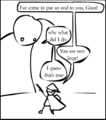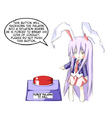Paladin: Difference between revisions
| Line 24: | Line 24: | ||
{{dnd-stub}} | {{dnd-stub}} | ||
;1st Edition | ;1st Edition | ||
:[[Alignment|Lawful Good]]. If you fuck up at being Lawful Good, you're busted down to Fighter at the same level, and your church shuns you. | :[[Alignment|Lawful Good]]. If you fuck up at being Lawful Good, you're busted down to Fighter at the same level, and your church shuns you. The controversial Unearthed Arcana book adds the chance to play Paladin-Cavaliers, who are incredibly ridiculous in power level (can stay conscious and retreat at negative hit points, can boost Str, Con, Dex, and Cha a little bit each levellup, immunity to fear, etc). | ||
;2nd Edition | ;2nd Edition | ||
:A sub-class of Warrior, | :A sub-class of Warrior, 2e Paladins are notable primarily by their potential to use Holy Avenger swords, which inflict an additional +10 damage versus Chaotic Evil foes (which is a lot for 2e), and create a circle of power that is a selective antimagic field versus lower level magical effects (so all enemy buffs and enemy magic items created by a level 12 wizard power down when a level 13 paladin walks up). The Cavalier kit recreates about half of the abilities they used to have for a Paladin; its notable that the Cavalier is where the fear immunity for a 3e Paladin comes from, not the Paladin. A Paladin probably does not have a good chance of being worthwhile compared to a fighter if they cannot expect to find their holy sword, however. | ||
;3rd Edition | ;3rd Edition | ||
Revision as of 03:46, 5 May 2011

Born to raze hell
Paladins are a class from Dungeons and Dragons. They are divine warriors of a somewhat more martial bent than Clerics, receiving a variety of powers generally focused around smiting the enemies of their god. Many a fictitious maiden has benefited from a Paladin's Laying On of Hands (HURR HURR HURR).
The burden Paladins bear to follow a strict code of conduct else they fall is often abused by dickish DMs, who seem to derive some sort of twisted pleasure out of forcing a player's Paladin into hideously arbitrary situations where any choice they take results in falling from grace and the stripping of powers. Even otherwise reasonable DMs seem to turn into complete dicks when presented with a chance to make a paladin player's life a misery. As a result, many avoid playing paladins entirely due to bad experiences with evil DMs.
Your party will never have to deal with the dilemma of "you can only save one: the baby or the nun" situations unless you have a paladin in the group.
Dragonladieshere tells it like it is
There is none of that, "Oh well if you're truly sorry, there's nothing I can do." horseshit. No, he coup de graces your ass because he's a goddamn paladin. His job is killing evil. You know what his job doesn't entail? Being a sympathetic ear for every whiny NE or CN or LE douchebag who's only being evil because the world is unfair to him or every punk that lets his own dislikes or laziness overcome his own personality. You know what unfair is? Being able to know what kind of person everyone is before you even talk to them. Smelling evil so potent on a motherfucker that you want to sink your fingers in his chest and pull that tar out until the screaming stops. Having the psychotic urge to murder people that you've never even met, for the sole reason that your God decided that you ought to be his right hand without your choice in the matter, that's unfair.
But unlike Evil McBlacknails over there, that Paladin puts on his helmet, sharpens his sword, and then continues walking through crowds of people day by day, resisting the urge. Seeing evidence of injustice so black it makes him sick. Seeing murderers and rapists walk the street, watching good men hang as evil ones pull the lever. Saving his righteous violence for when the situation exactly, specifically, precisely calls for it. Surgically removing that which is most evil. Because he's a Paladin. And if he gave in to the urge, what would he be? Who will right the true wrongs if not he? It's not about not falling as a Paladin. It's about falling so fucking hard you crash through the planet and stand up on the other side.'
- Dragonladieshere
For a player who understands what a paladin is like, see also Powder Keg of Justice.
Paladins in different editions of D&D
- 1st Edition
- Lawful Good. If you fuck up at being Lawful Good, you're busted down to Fighter at the same level, and your church shuns you. The controversial Unearthed Arcana book adds the chance to play Paladin-Cavaliers, who are incredibly ridiculous in power level (can stay conscious and retreat at negative hit points, can boost Str, Con, Dex, and Cha a little bit each levellup, immunity to fear, etc).
- 2nd Edition
- A sub-class of Warrior, 2e Paladins are notable primarily by their potential to use Holy Avenger swords, which inflict an additional +10 damage versus Chaotic Evil foes (which is a lot for 2e), and create a circle of power that is a selective antimagic field versus lower level magical effects (so all enemy buffs and enemy magic items created by a level 12 wizard power down when a level 13 paladin walks up). The Cavalier kit recreates about half of the abilities they used to have for a Paladin; its notable that the Cavalier is where the fear immunity for a 3e Paladin comes from, not the Paladin. A Paladin probably does not have a good chance of being worthwhile compared to a fighter if they cannot expect to find their holy sword, however.
- 3rd Edition
- Lawful Good, with an explicit Code of Conduct. However, fuckup paladins who decide to embrace evil had the option to multiclass into the evil prestige class Blackguard (described in the DMG), which receives bonus abilities if the character trades in levels of Paladin.
- 4th Edition
- In 4th Edition, the paladin must be the same alignment as their diety; no more Lawful Stupid. The slightest deviation from one's alignment no longer results in a DM bitchslap and losing class features; instead, you get vague threats that the other faithful of the paladin's religion will seek you out to administer chastisement for your failings. Paladin abilities are more focused on being a meat-shield than being a holy avenger; for more smite-evil action, you want the Avenger class from Player's Handbook 2. The paladin can no longer fall, so remember that the next time you find youself hanging from a cliff edge or dropping from an airship, you can float gently back to solid ground.
Gallery
-
No John, you are the smiteings
-
Unfunny cynicism.
-
PRO DM SKILLZ
-
Moar unfunny cynicism. Also, those aren't Paladins. Those are some order of medieval Crusading knights. Small difference.
-
Nothing says "fallen paladin" like smiting your teammates.
See Also
| Dungeons & Dragons 4th Edition Classes | ||
|---|---|---|
| Player's Handbook 1 | Cleric • Fighter • Paladin • Ranger • Rogue • Warlock • Warlord • Wizard | |
| Player's Handbook 2 | Avenger • Barbarian • Bard • Druid • Invoker • Shaman • Sorcerer • Warden | |
| Player's Handbook 3 | Ardent • Battlemind • Monk • Psion • Runepriest • Seeker | |
| Heroes of X | Blackguard* • Binder* • Cavalier* • Elementalist* • Hexblade* • Hunter* • Mage* • Knight* • Protector* • Scout* • Sentinel* • Skald* • Slayer* • Sha'ir* • Thief* • Vampire* • Warpriest* • Witch* | |
| Settings Book | Artificer • Bladesinger* • Swordmage | |
| Dragon Magazine | Assassin | |
| Others | Paragon Path • Epic Destiny | |
| *·: Non-AEDU variant classes | ||




